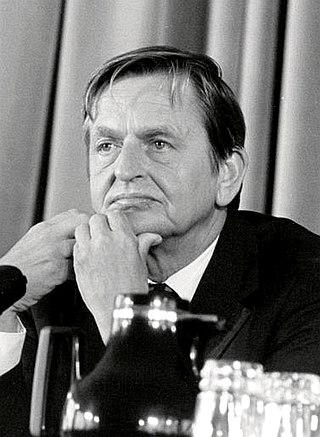
Sven Olof Joachim Palme was a Swedish politician and statesman who served as Prime Minister of Sweden from 1969 to 1976 and 1982 to 1986. Palme led the Swedish Social Democratic Party from 1969 until his assassination in 1986.

Gösta Ingvar Carlsson is a Swedish politician who twice served as Prime Minister of Sweden, first from 1986 to 1991 and again from 1994 to 1996. He was leader of the Swedish Social Democratic Party from 1986 to 1996. He is best known for leading Sweden into the European Union.
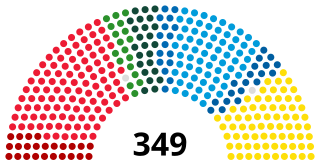
The Riksdag is the legislature and the supreme decision-making body of the Kingdom of Sweden. Since 1971, the Riksdag has been a unicameral legislature with 349 members, elected proportionally and serving, since 1994, fixed four-year terms. The 2022 Swedish general election is the most recent general election.

The Riksdag is the national legislature of Sweden. However, when it was founded in 1866 Sweden did not have a parliamentary system of government.
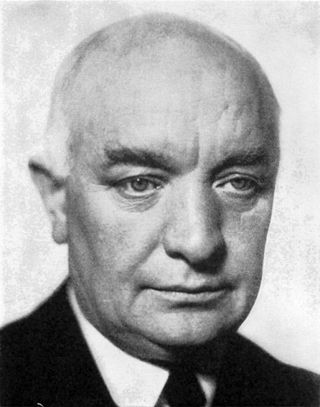
Per Albin Hansson was a Swedish politician, chairman of the Social Democrats from 1925 and two-time Prime Minister in four governments between 1932 and 1946, governing all that period save for a short-lived crisis in the summer of 1936, which he ended by forming a coalition government with his main adversary, Axel Pehrsson-Bramstorp.

The Swedish Social Democratic Party, formally the SwedishSocial Democratic Workers' Party, usually referred to as The Social Democrats, is a centre-left social democratic political party in Sweden. Globally, it is a full member of the Progressive Alliance and the Party of European Socialists.

Tage Fritjof Erlander was a Swedish politician and statesman who served as the prime minister of Sweden and leader of the Social Democratic Party from 1946 to 1969. Previously, he served as minister of education from 1945 to 1946, and was a member of the Riksdag from 1932 to 1973. During his premiership, Sweden developed into one of the world's most advanced welfare states, with the "Swedish Model" at the peak of its acclaim and notoriety. His uninterrupted tenure of 23 years as head of the government is the longest ever in Sweden and in any modern Western democracy.

Since the introduction of parliamentarism in Sweden, six national referendums have been held. Legal provisions for referendums were introduced in 1922, one year after the adoption of universal suffrage. The Constitution of Sweden provides for binding referendums, but all referendums held as of 2012 have been non-binding. The latest referendum, on adopting the euro, was held on 14 September 2003.

Ernst Johannes Wigforss was a Swedish politician and linguist (dialectologist), mostly known as a prominent member of the Social Democratic Workers' Party and Swedish Minister of Finance. Wigforss became one of the main theoreticians in the development of the Swedish Social Democratic movement's revision of Marxism, from a revolutionary to a reformist organization. He was inspired and stood ideologically close to the ideas of the Fabian Society and guild socialism and inspired by people like R. H. Tawney, L.T. Hobhouse and J. A. Hobson. He made contributions in his early writings about industrial democracy and workers' self-management.
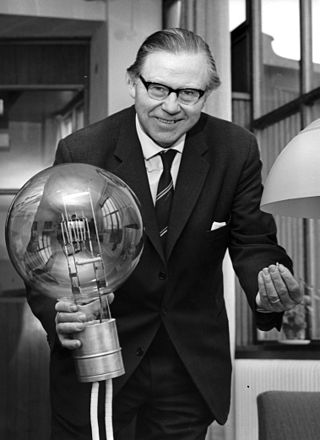
Gunnar Georg Emanuel Sträng was a Swedish trade union leader and Social Democratic politician, most known for being Sweden's longest serving minister for finance.

General elections were held in Sweden on 19 September 1948. Despite a campaign by a large part of the Swedish press against socializing insurances, controlled foreign trade and rationing regulations still in use since the war, freshman Prime Minister and Social Democratic leader Tage Erlander managed to defeat the People's Party-led opposition under Bertil Ohlin by a higher election turnout. He maintained his government with only minor losses and the Swedish Social Democratic Party remained the largest party, winning 112 of the 230 seats in the Andra kammaren of the Riksdag. Erlander was to stay on as Prime Minister until 1969.
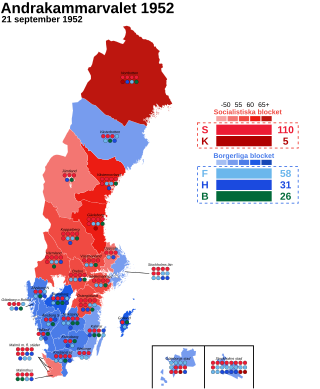
General elections were held in Sweden on 21 September 1952. The Social Democrats remained the largest party with 110 of the 230 seats in the Andra kammaren of the Riksdag and together with the Communist Party of Sweden they got 115 seats and the other parties 115 seats. Tage Erlander and his Social Democratic Party did however form his second government with the Farmers' League already in 1951 and together with that party the Social Democrats now had a majority of 136 seats in the chamber and together with the Communists 141 seats. In the other indirectly elected chamber the Social Democrats had an absolute majority.

General elections were held in Sweden on 16 September 1956. The Swedish Social Democratic Party remained the largest party, winning 106 of the 231 seats in the Andra kammaren of the Riksdag. A Social Democratic-Farmers' League coalition government was formed by Prime Minister Tage Erlander after the election with 125 of the total of 231 seats. Although the non-socialist parties held a majority in the Second Chamber, the Social Democrats held a majority in the First Chamber, so a non-socialist government could not be formed.

General elections were held in Sweden on 20 September 1964. The Swedish Social Democratic Party remained the largest party, winning 113 of the 233 seats in the Andra kammaren of the Riksdag. Tage Erlander's Social Democratic government was returned to power.

General elections were held in Sweden on 15 September 1968. Held in the wake of the crushing of the Prague Spring, it resulted in a landslide victory for the Social Democratic government and Prime Minister Tage Erlander. It is one of two general elections in Swedish history where a single party received more than half of the vote. Erlander would resign the following year after an uninterrupted tenure of 23 years as head of government.
Folkhemmet is a political concept that played an important role in the history of the Swedish Social Democratic Party and the Swedish welfare state. It is also sometimes used to refer to the long period between 1932 and 1976 when the Social Democrats were in power and the concept was put into practice, but also works as a poetic name for the Swedish welfare state. Sometimes referred to as "the Swedish Middle Way", folkhemmet was viewed as midway between capitalism and socialism. The base of the folkhem vision is that the entire society ought to be like a family, where everybody contributes, but also where everybody looks after one another. The Swedish Social Democrats' successes in the postwar period is often explained by the fact that the party managed to motivate major social reforms with the idea of the folkhem and the national family's joint endeavor.

The second cabinet of Stefan Löfven was the government of Sweden from 21 January 2019 to 9 July 2021. It was a coalition, consisting of two parties: the Social Democrats and the Green Party. The cabinet was installed on 21 January 2019, following the 2018 general election.

[Parliamentary] Committee on Taxation (SkU) is a parliamentary committee in the Swedish Riksdag. The committee manages and debates matters concerning state and municipal taxes and matters concerning taxation, tax payment, and, population registration, as well as matters concerning the enforcement system. Taxes also include customs duties and taxes comparable to taxes.
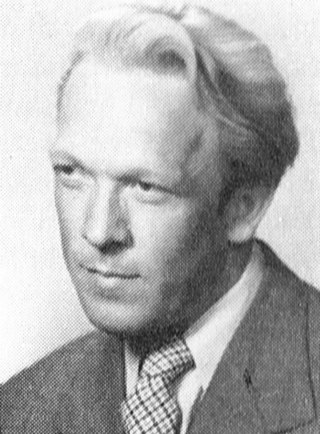
Sture Henriksson (1917–1957) was a Swedish trade unionist, ombudsman and social democrat politician who killed himself in 1957 while serving as the minister of communications.
















